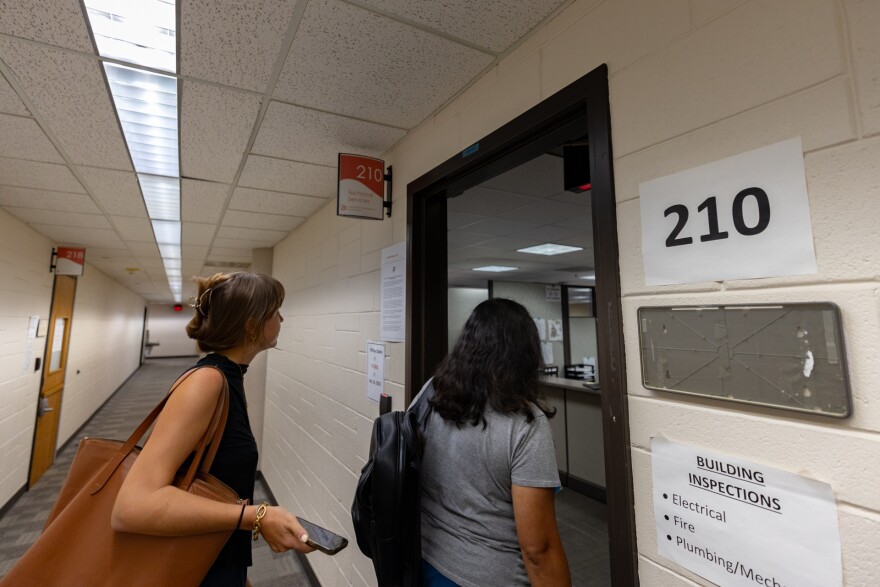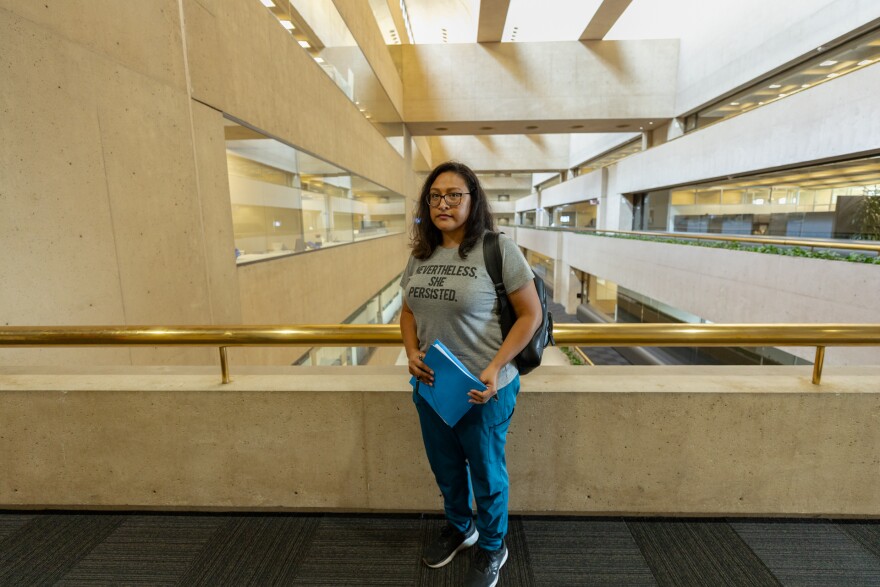Janie Cisneros had a mission. For the last two years, she has been organizing her West Dallas community around getting an 80-year-old shingle plant shut down.
The Singleton United/Unidos community group director says she has struggled with political posturing, failed negotiations and broken promises by Dallas city officials.
But Cisneros still decided to file an application to hopefully begin one of the only processes — up until recently — she says her community has at their disposal to get the plant shut down.
Cisneros and another community advocate were redirected to two different city buildings, and three different departments. The result? No dice. The City of Dallas refused to accept her application for a so-called application for amortization.
“They’re giving us the run around…no one wants to take this application, no one wants to speak with us,” Cisneros said in an interview with KERA. “Doors keep getting shut.”
KERA reached out to District 6 Council Member Omar Narvaez’s office, the City Attorney’s Office and the city’s communications department for comment about changes to the city's code and Cisneros' request for amortization, but only received comment from a city spokesperson before this story was published.
The filing would mean the Dallas Board of Adjustment would have to set a compliance date for the nonconforming use — or amortization. In other words, it’s a step closer to getting the plant shut down.
The GAF manufacturing plant has been in operation since the mid-1940s. West Dallas residents say the plant is polluting their air — and they’ve had enough. And they say city officials have turned a blind eye to their concerns.
Cisneros says the city refusing to accept the application is in direct violation of its code. The city counters that because of new state legislation, the process for amortization has changed.
But residents and environmental activists say the proposed city ordinance — aimed at bringing current code into compliance with the new laws — creates restrictions beyond the state legislation.
That includes removing a resident’s right to start the amortization process.
At the end of the day, Cisneros says that people in her community are already struggling — even without the everyday pollution and what she calls broken promises from City Hall.
“Everyone is trying to make it,” Cisneros said. “You don’t need this on top of that.”
‘Thank you for...visiting’
Cisneros showed up on Thursday to the Oak Cliff Municipal Center on Jefferson Boulevard with a blue binder full of application materials, documents and even print outs of emails from city officials explaining where she needed to go to file her application. But after a lengthy closed-door meeting with one of the Board of Adjustment Office staffers, Cisneros was told to go to city hall.
That proved to be yet another set of barriers. Cisneros was referred to the City Attorney’s Office. When she arrived — no attorneys could speak with her about the application. Instead, Cisneros was told to go to the City Secretary’s Office.
And after a back and forth between Cisneros, staffers and one assistant city secretary, the city refused to accept the application.
“Thank you for contacting and visiting the City Secretary's Office. As we discussed during your visit, we have consulted with our City Attorney's Office and unfortunately, we must inform you that the application you attempted to file with our office cannot be accepted by the City of Dallas,” Assistant City Secretary Miroslava Martinez said in an email to Cisneros.

Currently, city code says the Dallas City Council can request the board of adjustment set a compliance date for a nonconforming use — or amortization. And it also says that “any person who resides or owns real property in the city” may also request and file this application.
The city is currently updating parts of its code to follow a new state law that has changed how cities across Texas process amortization requests.
But Cisneros says that’s not what’s happening here.
“They’re breaking their own law, they’re breaking their own code and they’re breaking their own process,” Cisneros said on Thursday. “We’re following the process…and we’ve gotten nowhere…they are just refusing to accept the application.”
West Dallas residents and environmental activists say that legislation that has caused the barrier, is directly tied to the fight to shut down GAF.
SB 929
Senate Bill 929, which was signed into law by Texas Governor Greg Abbott in early May, changes the fees involved for a nonconforming use relocation and how a city must notify these properties after a zoning change.
The new legislation also gives property owners one of two options when faced with a potential compliance date — continue operation until costs are recovered or "shutting down within 10 days of receiving payment from the city for the amounts calculated," according to a statement from a city spokesperson sent to KERA.
The bill analysis submitted by Republican Sen. Tad Parker uses a strikingly similar narrative as the struggle over the GAF facility.
“…In one case a city threatened to drive a roofing materials factory that employs 150 workers from their property without giving them a dime even though they legally called the factory their home of 80 years,” the analysis said.
Due to the legislation, “the city is not accepting applications for the board of adjustment to establish a compliance date for a nonconforming use,” according to a notice on the board’s website.
And the city is also updating their city code to comply with SB 929. The draft ordinance city staff is scheduled to present to the city’s Zoning Ordinance Advisory Committee on Tuesday removes a resident’s ability to apply for amortization directly.
The new process, according to an email from a board official, is to submit a request to a council member. The council will review the submission — and refer the request to the board if acceptable.
Even though the city’s code has not been officially updated — Cisneros tried to file an application anyways. And she officially requested that Narvaez instruct the board of adjustment to investigate amortization.
“Champion my right to file,” Cisneros said in her email to Narvaez. “Let me know what else you need from me to move this forward so West Dallas families can breathe clean air.”

In a request to the City Attorney's Office for comment, KERA asked about the current process for amortization, the effects of SB 929 and the legal grounds for denying an application before city code has been updated. City officials responded to only a few questions before this story was published.
"Because our development code has not been amended yet to reflect the changes in state law, the city cannot process a request to establish a compliance date at this time as it would be in conflict with state law and/or the city code," a city spokesperson said in a statement to KERA.
Cisneros says the application is years in the making.
In 2022, GAF executives, city officials and West Dallas community members came together to start a series of negotiations that were aimed at creating a timeline for the company leaving the area.
“This was because we were threatening for amortization,” Cisneros said. “Our councilman…convinced us to not amortize…to instead let’s try and negotiate with the company.”
Cisneros says they settled on a month of negotiations — under the provision that the city would file for amortization if the community’s wishes weren’t met.
“GAF met with City leaders and West Dallas community group representatives to share a responsible and considered plan to pursue a legally-binding winding down of operations in West Dallas over the next 7 years," a GAF spokesperson told KERA in an email at that time.
The spokesman said that the details of the timeline for shutting down were "something that we are actively working on to ensure we do right by the community, our employees, and the thousands of homeowners in Texas and the region who rely on our products every year.”
'Our mission has not changed'
West Dallas residents living near the GAF plant complain about foul smelling air and concerns about their children playing outside for too long. The plant churns out shingles and other roofing materials. In the process, it spews out high levels of damaging pollutants.
One of those pollutants, particulate matter, has been shown to cause sever health effects including asthma, COPD and different types of cancers. Researchers say there is no such thing as a safe level of particulate matter.
Community members and environmental activists say they have been asking the city for years to hire an outside consultant to calculate what the city might have to pay to the company that owns and operates the GAF facility.
Cisneros and other environmental advocates tied to the West Dallas’ community say to their knowledge, the city hasn't completed the amortization calculation — so Singleton United/Unidos hired someone to do it.
An amortization report obtained by KERA calculated the possibly cost city officials would need to pay to GAF executives ranges from $36 million to $45 million over the span of around two to three and a half years.
That’s nearly half the time quoted by GAF executives when Singleton United/Unidos started negotiations with the company last year.
Cisneros and other environmental activists say they will oppose the city's drafted ordinance that is scheduled to be voted on by the Zoning Ordinance Advisory Committee on Tuesday.
Cisneros says at the end of the day, her goals — and the goals of the community — have not changed.
“Our goal and our mission has not changed, it’s the same thing we’ve been wanting,” Cisneros said. “Clean air, protection of public health and families. And for others…its been political.”
Got a tip? Email Nathan Collins at ncollins@kera.org. You can follow Nathan on Twitter @nathannotforyou.
KERA News is made possible through the generosity of our members. If you find this reporting valuable, consider making a tax-deductible gifttoday. Thank you.




